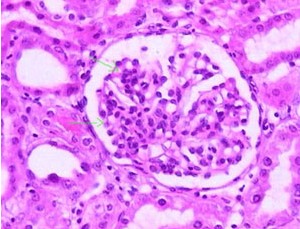
Nephrotic Syndrome, also known as Nephrosis, is defined by the presence of protein in the urine, low blood protein levels, edema or swelling, high cholesterol levels, and high triglyceride levels. This kidney disease can occur at any age. In children, it is most common between the ages of 18 months and 4 years, and more boys than girls are affected. In older people, both sexes are equally affected.
Causes
Nephrotic Syndrome can be primary, affecting only the kidneys, or secondary, caused by a vast array of disorders that affect other parts of the body, most commonly Diabetes, systemic lupus erythematosus, and certain viral infections.
Besides, it can also result from glomerulonephritis, a number of drugs that are toxic to the kidneys (especially nonsteroidal anti-inflammatory drugs, or NSAIDs), certain allergies (allergies to insect bites, poison ivy, or poison oak), and hereditary factor.
Exams and Tests
•Urine tests. A urinalysis can reveal abnormalities in the urine, like excessive proteinuria (>3g/24h), if the person has NS. A 24-hour urine collection is needed for an accurate measure of the protein in the urine.
•Blood tests. If a person has Nephrotic Syndrome, a blood test may show low levels of the protein albumin specifically and, often, decreased levels of blood protein overall.
• Creatinine and creatinine clearance. Results of these tests give information on how well the kidneys are functioning.
• Kidney ultrasound to look at the kidneys. This exam helps to rule out other causes of the symptoms.
In adults, testing usually includes:
• Serum protein electrophoresis (SPEP)
• Antinuclear antibodies (ANA)
• Antibody tests for systemic lupus erythematosus
• C3 and C4 complement, proteins normally found in the blood
• Tests for hepatitis B, hepatitis C, and HIV
Unless Nephrotic Syndrome is clearly caused by Diabetes, a kidney biopsy may be recommended to remove a sample of kidney tissue for testing. Children do not usually have a biopsy.
Outlook
The outcome varies depending on the cause of the Nephrotic Syndrome, the person's age, and the type and degree of kidney damage. Symptoms may disappear completely if the disease occurs as a result of a treatable disorder, such as an infection, drugs, etc. If the underlying condition responds to corticosteroids, progression of the disease is halted at times, and less often the condition partially or, rarely, completely reverses.
Fortunately, if patients do not respond to drugs treatment, there is alternative therapy to help them avoid progressing to Kidney Failure. For information about the best treatment for you, feel free to Contact Us.
Make An Appointment or Referral Today
Please call Viber or Whatsapp: or email to (Monday through Sunday)
to make an appointment or request an Online Doctor Consultation

Nephrotic Syndrome is a kidney disorder, wherein large amount of protein leaks from the blood into the urine, due to damaged kidneys. This spill eventually leads to depletion of protein levels in the body, and increase in the levels of lipid and causes swelling (or edema). Individual who develop Nephrotic Syndrome may present symptoms as below.
• Foamy or frothy urine
The first symptom of Nephrotic Syndrome is often foamy or frothy urine. This is due to excess Protein in Urine. When the filtering units of the kidney are damaged, protein normally kept in the plasma will get released into the urine in large amounts, which decreases the amount of protein in the blood.
• Swelling, or edema
Swelling, or bloating of the body due to accumulation of water in excessive amounts. About 90% of the patients suffering from this disorder will experienced this condition. The edema, or swelling may be noticed in the eyelids, face, feet, hands, abdomen, knees, and scrotum, etc.
• High Blood Pressure
Because the kidneys are involved in blood pressure regulation, an individual suffering from this disease experiences high blood pressure regardless of the age.
• Weight gain
If the body retains water, rapid weight gain may be caused.
• Fatigue
People with this disorder will feel increasingly weak and fatigued.
• Poor Appetite
Poor appetite may be result from buildup of toxins in the body due to kidney dysfunction of filtering toxic wastes, medicines, and diet changes.
Over time, the loss of protein causes the muscles to become weak and small (muscle wasting). Patients may notice abdominal pain and short of breath. The protein loss will result in a general malnourished state. Hair and nails become brittle, and growth is stunted. Bone becomes weak, and the body begins to lose other essential nutrients such as sugar, calcium, and potassium. Infection is a severe and frequent complication, as are disorders of blood clotting.
If you have some of the above discomforts, see your doctor to discuss what might be causing them and corresponding treatment. Or, feel free to Contact Us.
Make An Appointment or Referral Today
Please call Viber or Whatsapp: or email to (Monday through Sunday)
to make an appointment or request an Online Doctor Consultation

As one of the nation's most active programs for the treatment of Nephrotic Syndrome, we have a level of experience and skill that surpasses more other centers. This level of expertise can mean a higher likelihood of successful treatment.
Working together closely, a team of some of the nation's top nephrologists works together to plan your treatment carefully when you come to our center. They customize your plan of action to be sure it delivers the most-advanced Nephrotic Syndrome treatment with no side effect on your body.
If you or your beloved one has been diagnosed with Nephrotic Syndrome, our kidney doctors will discuss the best treatment option. They communicate and collaborate at every step to increase your chances for successful treatment. One or more of the therapies as below may be recommended to treat your kidney disease.
Blood Pollution Therapy
Blood Pollution Therapy is the most effective treatment for Nephrotic Syndrome. This is a holistic treatment which can treat kidney disease from the root cause and avoid further relapse.
The whole treatment process includes three steps: advanced blood purification techniques to clear up toxins in the body, supply essential elements to the blood, and restore the kidney function as well as regulate the immune system.
To what degree can you recover under this treatment? Feel free to Make an Appointment with renowned kidney experts for comprehensive analysis.
Immunotherapy
Nephrotic Syndrome is usually an autoimmune disorder. So, Immunotherapy is a good choice of natural treatment for this kidney disease.
The whole treatment include six steps named an accurate diagnosis, inhibit excessive inflammatory response, immune tolerance, immune adjustment, immune protection, and immune clearance. Based on each patient's specific illness condition, certain steps are chosen to ensure satisfactory curative effects.
Micro-Chinese Medicine Osmotherapy
If you are seeking for herbal medicine treatment for Nephrotic Syndrome, Micro-Chinese Medicine Osmotherapy is the best available option. However, different from conventional herbal remedy, this treatment is an external application with no side effect to human body.
Chinese herbal medicine selected by kidney experts based on personalized condition is micronized into one thousandths of its original size. By applying microwave, the medicine will be permeated into the renal lesion directly through the skin and channels.
Effective ingredients of Chinese medicine can function to expend the blood vessels, inhibit excess inflammatory reaction, anti-coagulation, and degrade immune complexes and extracellular matrix. Treatment effects can be seen soon within one week after getting this therapy. If you are interested to get more detailed information, feel free to Contact Us.
Make An Appointment or Referral Today
Please call Viber or Whatsapp: or email to (Monday through Sunday)
to make an appointment or request an Online Doctor Consultation

Individuals who suffer from Nephrotic Syndrome can help to ease the symptoms of the disease and slow down kidney damage by eating a special renal diet and living a healthy lifestyle. So, work with your nutritionist to develop a good plan for your situation or make an appointment with renowned nephrologists for personalized advice!
1. Special diet
- Ensure that sodium content in your diet is minimum. Avoid foods like salted wafers, popcorns, pork rinds, potato chips, canned foods (meat, vegetables, soup), pickles, and salted nuts.
- Restrict intake of water, juices, and other beverages. Consult your health care provider or Contact Us to know the permissible quantity of fluid intake.
- Moderate protein intake can help preserve kidney function. Consume foods such as wheat, sprouts, egg whites, lean meat, fish, etc in moderation.
- Ditch high cholesterol foods including organ meat, fried foods (French fries, cookies, crackers), egg yolk, processed meat, fast foods, seafood (lobsters, oiled packed fish), and dairy production (ice-cream, cheese, margarine, and butter).
2. Exercise
Exercise is an important part of managing a healthy lifestyle. Being physically active will help keep the body strong and flexible which can help handle with Nephrotic Syndrome a lot. Talk to your doctor about beginning an exercise program. Most people with Nephrotic Syndrome can benefits from certain type of activities, such as walking, jogging, swimming, cycling, etc.
3. Keep balance between work and rest
Avoid strenuous and over-strain physical activity, both of which may aggravate you kidney disease. Therefore, it is essential to have enough rest and do proper exercises in the daily life.
4. Avoid using substances that may harm your kidneys
These include alcohol, any kind of tobacco, or illegal medications. Take drugs according to your doctor's instructions. Practice good skin care to prevent additional skin problems like skin infections.
Make An Appointment or Referral Today
Please call Viber or Whatsapp: or email to (Monday through Sunday)
to make an appointment or request an Online Doctor Consultation

